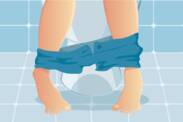Symptoms associated with the excretory system

Assisting
Children suffer from it more often. However, this problem does not avoid adults either. The culprit may be a psychological problem, but also an organic damage or disease. It can be a disease of the urinary tract and other parts of the body. It can be long-term, but also transient.

Proteinuria
Protein in the urine is a sign of impaired kidney function, or occurs for other disease causes. However, some small amount of protein tends to be present in the urine even in the absence of disease.

Blood in the power
Blood in the urine is usually present for a variety of reasons. These are often benign. However, it happens that behind this symptom there is a serious and malignant disease.

Sugar in urine
Sugar is the most important substance for the body. The body is careful in managing its levels. It does not excrete it. Sugar is not normally found in the urine. However, there are cases where it is present.

Frequent urge to urinate
In older age, it affects both women and men. But in the case of some diseases, it does not skip childhood. It is caused by inflammatory diseases of the urinary system, but also by other diseases. It is common in pregnancy. Drinking is also important.

Frequent urination
More frequent urination for a small urge may not be anything serious. But it may signal a certain disorder or disease. How frequent urination is considered normal?

Urinary retention - anuria/retentiveness
Any urinary disorder, such as urinary cessation, urinary retention and production of insufficient amount of urine, points to a disease of the urinary system.

Cloudy urine
The colour of urine depends on various factors that are not a symptom of disease, such as dehydration, fever, or after heavy exertion. However, diseases also cause cloudy urine. Examples of these are inflammation, kidney stones, or other causes.

Dark urine
The colour of urine reflects the state of hydration of the body. Urine is darker in the morning, but during the day and with a proper drinking regime, its shade lightens and becomes light yellow. It can be coloured by certain fruits and vegetables. Dark urine also has causes in diseases.

Skin pain
Skin pain is a symptom that occurs when there is an injury to the skin, which may be a cut, burn, scald or frostbite. Of course, skin pain is a typical symptom of skin disease. And this is, for example, a fungal, mycotic disease. However, other diseases are also manifested by it.
The excretory system is one of the very important systems in the human body, as it is responsible for filtering the blood and the whole body from harmful and waste substances, which are then excreted out of the body. This system consists of the kidneys, ureters, bladder and urethra, with the function of filtering, storing and removing harmful substances from the body in the form of urine. The entire system directly regulates blood composition, fluid balance in the body, and excretion.
Many times the symptoms associated with excretion are not only directly related to a disease or problem in the excretory system and its organs, but they can also suggest a lot about other systems in the body and also about systemic diseases. As waste and excess substances are excreted from the body in the urine, this is how the levels of substances in the body, blood, and possibly infections, for example, manifest themselves. Sometimes there may even be an interconnectedness with the digestive system, for example when urinating feces.
Most often, however, disease manifestations are associated with the organs of the excretory system. It is very important to note the pain in the kidney area, because the kidneys are an inevitably important organ, and their failure means the internal disruption of the body's environment, the inability to excrete waste and harmful substances from the body, and it is necessary to replace them with dialysis. Also, various symptoms associated with the composition of the urine, such as blood in the urine or other substances, indicate either hemorrhage or other diseases of the internal systems.
Substances or blood in the urine
For example, protein can be found in the urine during laboratory tests. This may be a transient or even more serious phenomenon, for example, associated with glomerulonephritis, multiple myeloma or amyloidosis. The presence of sugar in the urine can be either a temporary elevated glucose level or a permanent value, which most often indicates diabetes. Elevated concentrations in the blood at the same time may also indicate diabetic nephropathy or even Cushing's syndrome.
A big problem is the appearance of blood in the urine. If it is only a microscopic occurrence, it is a condition called microhematuria and the cause can be either nephritis, kidney tumors, infection with Escherichia coli bacteria, or in worse cases, prostate cancer. If blood is present in large quantities, it can also stain the urine. More blood in the urine is usually a sign for kidney stone problems, inflammation of the urinary tract or in men a sign of prostate cancer.
Dark and cloudy urine
In the normal case, healthy urine is clear and golden yellow in colour, and its cloudiness can indicate a rather serious problem without a previous obvious cause. The urine may be clouded by some substances, such as proteins, or directly by blood. Many times it can be an indication of inflammation or infection in the urinary tract, in women also of endometriosis, when the urine is clouded slightly with blood, especially during menstruation. However, if the urine is cloudy only in the morning, this is natural.
Similarly, the darker the colour, because in the morning one urinates the accumulated fluid from the whole night and it is usually darker, so in this case there is no need to worry. Darker urine may also indicate a higher concentration of salt, mucus, fats or other substances. However, if it is a longer-term symptom, it is possible that various diseases are behind it, such as cirrhosis, jaundice, kidney problems or even alkaptonuria, which is a hereditary disease caused by chromosome recessiveness.
Frequent urination and urge to urinate
Symptoms of problems in the excretory system include problems directly with urination. For example, frequent urges to urinate, which can be related either to excessive waste production or to problems directly in the urinary system, for example in bladder inflammation or kidney diseases such as kidney inflammation or urinary stones that form in the kidneys. Frequent urination, in turn, is quite common, especially with infections and inflammation.
In men, frequent urination can sometimes be linked to an enlarged prostate or even prostate cancer, in women to ovarian cancer or gonorrhoea. Inflammation of the bladder or urinary tract is also usually manifested by an urgent need to urinate. The latter also arises with an enlarged prostate due to an obstruction within the urinary tract. Urinating large amounts of urine in turn can be a symptom for kidney problems, Cushing's syndrome or a disease called Diabetes indipidus.
Little or intermittent urination
A person urinates a little also with several inflammations in the excretory system. Whether it is glomerulonephritis, inflammation of the urinary tract, urinary stones or prostate enlargement, all these diseases are directly related to the urinary system. Sometimes, however, cholera or botulism, or peritonitis, which is an inflammation of the thin membrane in the abdominal cavity, also manifests itself in this way. In this case, therefore, it is also a symptom of diseases which at first sight have nothing to do with excretion.
The feeling of imperfect urination is usually associated with an obstruction, for example, when the prostate is enlarged or when there are urinary stones in the urinary tract. Sometimes it can also accompany incontinence. Similarly, urinary stones or prostate enlargement may also be manifested by the inability to urinate quickly due to the presence of an obstruction in the urinary tract. Intermittent urination is also associated with these diseases, possibly with inflammation in the ureters.
Urinary leakage is also a problem
The inability to hold urine is called incontinence and is a condition where urine leaks spontaneously. This can be related to a variety of diseases, sometimes including an enlarged prostate, but more likely to diseases of the nervous system, such as Parkinson's or Alzheimer's disease. Disorders also occur in autoimmune neuropathy. In younger children, bedwetting is typical, especially at night. The influence of psychological factors must also be considered here.
Urination is also sometimes associated with epilepsy, especially during epileptic seizures, when urine may leak due to muscle twitching and the inability to control these muscles. Bedwetting in adults can also be caused by certain parasitic diseases, such as enterobiasis. If urine leakage occurs after urination, it is either due to an enlarged prostate, anomalies in the urethra or inflammation in the urinary tract.
Watch out for other urination problems too
A rather dangerous symptom is also cessation of urination. This is mainly related to kidney failure or blockage of the lower urinary tract, and a person should always see a doctor in this case and undergo an examination. Similarly, faecaluria, that is, when faeces and stools occur in the urine, is a dangerous phenomenon and is most often related to the passage of faeces from the intestines into the urinary tract on the basis of the formation of a tear in the intestine. This disease is complicated and serious.
Metabolic disorders in the body or improper diet can result in smelly urine, but sometimes there are more serious diseases in the body, for example, phenylketonuria. Several sexually transmitted diseases are also manifested by urinary tract and urination problems. For example, itching of the urethra can indicate gonorrhea, but also inflammation of the vagina in a woman. In men, a purulent discharge from the urethra is a typical symptom of gonorrhoea.









